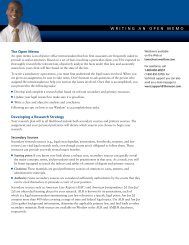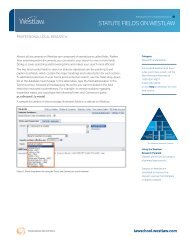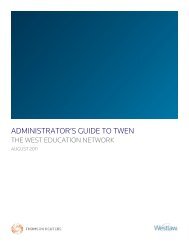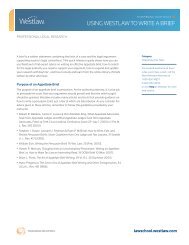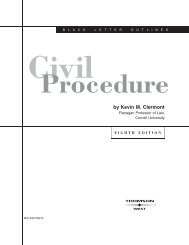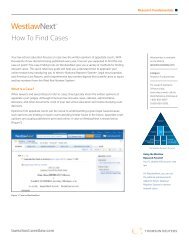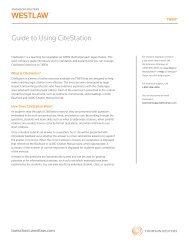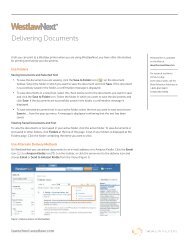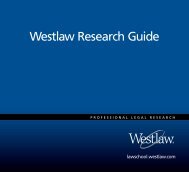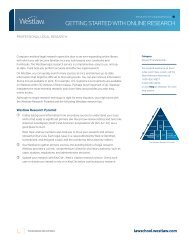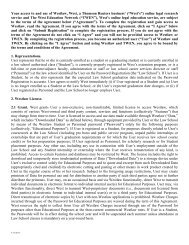Winning Research Skills - Westlaw
Winning Research Skills - Westlaw
Winning Research Skills - Westlaw
You also want an ePaper? Increase the reach of your titles
YUMPU automatically turns print PDFs into web optimized ePapers that Google loves.
Fundamentals of Statutory Law<br />
For statutory research, you will probably want to use an annotated code, which contains the<br />
same text and title and section numbers as the official USC, and also provides notes of cases that<br />
have construed the statutes and references to regulations and secondary sources. An annotated<br />
code includes cross-references to related sections within the code and refers you to the research<br />
tools provided by its publisher.<br />
United States Code<br />
The USC is published by the U.S. Government Printing Office. The set is recompiled every six<br />
years, using the same 50 subject categories or titles. Congress has deemed the USC to be prima<br />
facie evidence of the law. While the USC has the advantage of being official, the unofficial USCA<br />
is a more helpful research tool.<br />
The USC and the USCA each contain the text of the law. However, the USC does not give<br />
citations to cases that have interpreted the statutes. Moreover, the USC may not be as current as<br />
you need. It is reissued every six years, with cumulative annual supplements between the new<br />
editions. In reality, the annual cumulative supplements do not appear in the library until eight<br />
months to two years have passed. Therefore, if you rely only on the USC, you will miss current<br />
laws, amendments, and deletions.<br />
Note that both The Bluebook and the ALWD Citation Manual recommend citing the official<br />
code when possible.<br />
United States Code Annotated<br />
The USCA is an excellent example of the West publishing philosophy. West believes in providing<br />
as much information as possible and giving researchers tools that help them use that information<br />
efficiently and effectively. The USCA fills more than 200 volumes and provides researchers with<br />
citations to cases and a wide variety of other references. Because the statutory text is editorially<br />
enhanced with notes and references to other research materials, the USCA is easy to use and an<br />
entry to a system of statutory research.<br />
Directly following the text of the statute in the USCA, you find the history of the statute. It<br />
indicates, in parentheses, when the law was originally passed and when it was amended or<br />
repealed. It provides citations to the origin of the text in the Statutes at Large as well as<br />
references to amendments. The historical notes also provide detailed information regarding<br />
specific textual changes. All this information can be extremely helpful when a law has gone<br />
through several revisions.<br />
The USCA provides cross-references to related and qualifying laws. Other references indicate<br />
where corresponding legislative history can be located in USCCAN. In addition, you will find<br />
citations to the Code of Federal Regulations (CFR), which is the official regulatory code.<br />
The Library References section provides applicable West topics and key numbers and citations<br />
to Corpus Juris Secundum (CJS), a West legal encyclopedia. West’s topics and key numbers give<br />
you access points into the West digests. The USCA also contains references to other relevant<br />
materials published by West, such as West’s Federal Forms.<br />
The USCA is known for its abundance of annotations of court and administrative decisions.<br />
Annotations are one-sentence summaries, written by West attorney-editors, that indicate how<br />
courts or administrative bodies have interpreted a law. The case citation appears at the end of<br />
<strong>Winning</strong> <strong>Research</strong> <strong>Skills</strong> 37



